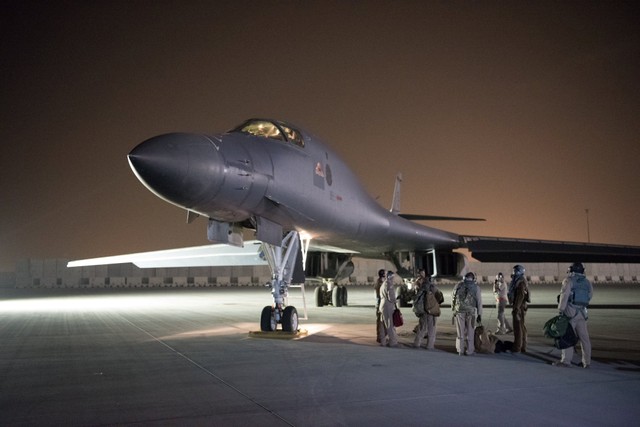Editor's note: Dr. Terry F. Buss is a fellow of the U.S. National Academy of Public Administration. He wrote this article exclusively for Tuoi Tre News.
Last week, U.S. President Donald Trump, along with Britain and France, launched a “surgical” missile strike against Syrian government chemical weapons facilities in retaliation for attacks on civilian rebel populations.
Reporting and commentary on the strike in the U.S. media and internationally was interpreted in so many disparate ways that those watching or reading the news must be totally confused. What did the strike even mean?
What nearly all of the coverage had in common was a focus on Trump, much of it negative. None of it shed much light on what really happened and why.
Competing storylines
Opponents immediately complained that the missile strike was intended to draw attention away from the numerous political and personal scandals swirling around Trump.
He was bombarded in the media over scandals involving salacious sexual indiscretions, treasonous collusion with Russian intelligence to defeat Hillary Clinton in 2016, and fraudulent business dealings.
Other opponents, particularly those running for president in 2020 against Trump, argued that the strike was unconstitutional and should have been approved by Congress. This is one more “count” against Trump for those trying to remove him from office.
Some proclaimed the strike a success: It eliminated a major chemical weapons complex. But opponents complain that Syrians could be easily reassembled the complex elsewhere; recalling that one year ago, Trump ordered chemical facilities eliminated for previous attacks on civilians. The strike wasn’t a deterrent then.
Many questioned the surgical nature of the strike. Russians appeared to have been warned so they would not retaliate. Care was taken not to hit Russian or Iranian troops for fear of starting a full-scale war. Syrian leader Bashar al-Assad laughed off the attack. Secretary of Defense James Mattis went so far as to declare this a “one-off” attack with no follow up.
Trump is often accused of being too supportive of Russian President Vladimir Putin. Conspiracy theorists were everywhere in the news, claiming Trump’s tepid missile strike was further proof of his Russian complicity. Trump did himself no favors when he reversed sanctions that had been prepared to punish Putin. In so doing, Trump undercut UN Ambassador Nicki Haley who had announced them in the UN Security Council.
For opponents, surgical strikes like this rarely, if ever, work. The retaliatory missile strike on Saddam Hussein’s palace in 1993 for his attempted assassination of President George H. W. Bush was followed by the gassing of Saddam opponents in northern Iraq.
Many critics opined that the Russians and Iranians were now likely to launch cyber attacks against the US. These attacks are easy to execute, difficult to defend against, and perpetrators hard to identify. This would be the price to pay for the attack. But, they note that Trump has been slow to blame Russia for its cyber activities and has not made an effective cyber defense a priority.
Numerous opponents reside in the White House and intelligence agencies. They came out “in force,” always covertly and anonymously after the strike. They complained of the confusion and chaos surrounding the decision making to launch an attack. Once it succeeded, critics assaulted Trump for not having a Syria strategy.
As part of the chaos, Trump earlier on announced he was pulling out of Syria. The US has 2,000 special forces troops and a massive naval and air force presence there. Then he proceeded to launch the strike. Now he plans to pull out again. To add to the confusion, French President Emmanuel Macron announced that he had talked Trump out of withdrawing from Syria, only to be reputed by Trump. Trump’s Syrian policy changes daily.
Britain was caught up in politics as well. The storyline was to be that the US, and many nations, had united behind Britain when the Russians allegedly poisoned a former spy living in London. The missile strike was to be a united US, Britain and France initiative. But opponents turned it into an anti-Brexit story. PM Teresa May was accused of participating in the strike to draw attention away from her efforts to withdraw Britain from the European Union (“Brexit”). Importantly, she was not supporting Trump.
Conclusion
The Syrian missile strike illustrates in microcosm how low the news media has sunk while trying to denigrate Trump or remove him from office. The media is literally “throwing everything they can against the wall hoping it will stick.” Perhaps Trump and his colleagues deserve it: His global leadership approval rating, according to a Pew Center study, is only 30%. Regardless, the media and Trump are a perfect marriage for disaster.
But, the price citizens are paying in not being well-informed, even after consuming numerous news sources on multiple media, cannot be good for American democracy, especially with a president who behaves so “unconventionally.”
How can citizens make decisions about politics with this cacophony of conflicting, false misinformation? They can’t: They are either withdrawing from politics or selectively consuming information that supports their own biases. The citizenry is deeply fragmented.
The New York Times, Washington Post, and CNN made the decision to go negative on Trump beginning in 2016. They have succeeded. The top news sources in the US, based on credible Harvard University research, shows that the reporting is nearly 95% negative.
Some might argue that we’re mixing hard news and commentary. But, as part of going negative, news has become increasingly slanted and opinionated, blurring the lines.
All of this is made worse by social media commentators and bias and censorship in the coverage of political events from Facebook, YouTube, Twitter and Google.
This needs to stop. News media needs to return to the professional journalism around before Trump and Obama.























































